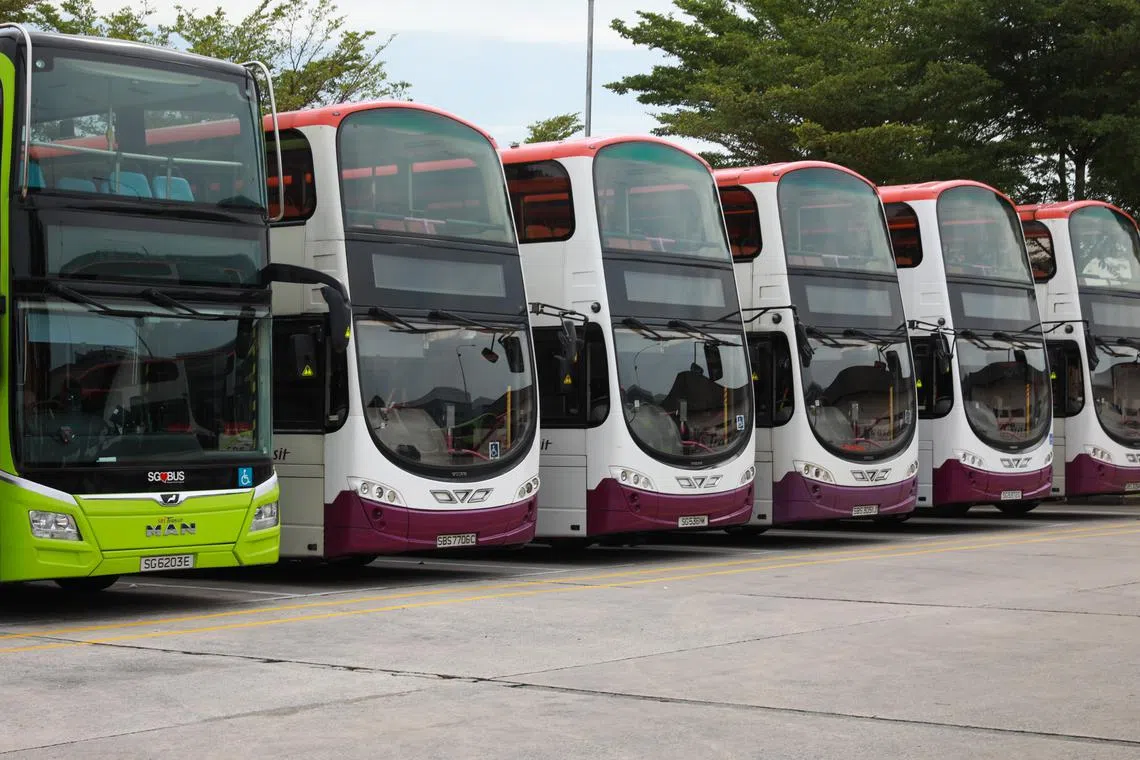Contract to run 27 public bus routes in Tampines from 2026 up for bidding
Sign up now: Get ST's newsletters delivered to your inbox

The Land Transport Authority called a tender on Dec 19 and it expects to award the new bus contract by the second half of 2025.
PHOTO: ST FILE
Follow topic:
SINGAPORE – Public transport operators have been invited to submit bids to run 27 public bus routes under the Tampines bus package from 2026, with electric bus operations set to be a key factor in the evaluation process.
The Land Transport Authority (LTA) called a tender on Dec 19, and it expects to award the new bus contract by the second half of 2025.
The incumbent, SBS Transit (SBST), has been running the Tampines bus package since 2016. Its existing contract with LTA is set to expire in July 2026.
The package is composed largely of trunk routes, such as those of bus services 10, 23 and 81, and will include a new bus service that will be launched in 2025 as part of the $900 million Bus Connectivity Enhancement Programme
More details about the new service will be provided when available, LTA said in response to queries.
The routes under the Tampines package, which currently operate from Bedok North Bus Depot, will be supported by the upcoming East Coast Integrated Depot when it opens in 2026, LTA added.
The facility in Changi will house a multi-storey bus depot that will be able to hold more than 500 buses and charge more than 200 electric buses, and also hold train depots serving three rail lines
Besides the quality factors that LTA had looked at in the past, the authority said it will be evaluating proposals for electric bus operations for the latest tender.
This means taking into consideration how the bidding companies intend to optimise deployment and maintain the battery-powered buses and supporting infrastructure, and how they will ensure safe operations, LTA added.
Separately, LTA told The Straits Times that all future bus depots in Singapore will be equipped with electric vehicle charging systems.
This is to support the electrification of the public bus fleet. The authority has committed to buying more than 2,000 electric buses over the next five years. By 2030, half of the 5,800 public buses here will run on batteries.
As at December, there are 70 electric buses plying public routes
LTA said it will review whether older and existing bus depots can be upgraded to support electric bus operations. Chargers will be installed at selected bus interchanges to provide range extension when needed.
Today, there are a total of 42 plug-in chargers installed at Bulim, Seletar and Loyang bus depots, and four overhead chargers at Bukit Panjang and Bedok integrated transport hubs.
When the newly constructed Sengkang West bus depot starts operations in early 2025, 240 high-powered plug-in chargers will be added to the pool.
Another 240 plug-in chargers are being installed at the upcoming Gali Batu Bus Depot, though this and other additional works have caused the project’s completion to be pushed back to mid-2025.
Originally meant to expire in 2024, SBST’s contract for the Tampines package was extended until 2026 at a lower fee, as part of a deal made between the operator and LTA to shift the Downtown MRT line (DTL) – which SBST also runs – to a different financing framework
Responding to questions about the status of other bus contracts that are due to expire in the next year or two, LTA said only that competitive tendering remains a key tenet of the bus contracting model, which was adopted in September 2016.
Under this model, bus services are bundled into 14 packages by geographic area, and operators are paid to run bus services at standards that LTA sets through a competitive bidding process. The Government owns all operating assets and collects fares.
Contracts run for an initial five years, with an option for an extension.
While such extensions initially were for two-year stretches, more recent tenders have given LTA the option to extend bus contracts by as long as five years.
“When deciding between a contract extension and competitive tender, several factors are taken into consideration, such as the prevailing market condition and impact to operations,” LTA said.
As part of the DTL deal, four other SBST bus contracts – Bedok, Serangoon-Eunos, Clementi and Bishan-Toa Payoh – were extended by an average of three years in 2022, but it has not been made public when exactly these would expire.
LTA did not respond directly to ST’s questions about the Sengkang-Hougang bus package, which is run by SBST too. That contract was due to end in 2024, but has not been put up for tender yet.
The Tampines contract is likely to draw interest from both local and foreign players, with previous bus tenders in 2022 and 2023 getting bids from the four current local operators – SBST, SMRT, Tower Transit Singapore and Go-Ahead Singapore – as well as foreign firms such as Spain’s Nex Continental Holdings and France’s Transdev Group.
Without providing more details, SBST spokeswoman Grace Wu said the company is excited to participate in the Tampines bus tender and will put in a competitive bid with a “strong value proposition”.
The Singapore University of Social Sciences’ Associate Professor Walter Theseira said local operators like SBST have the experience to operate electric buses, but this has largely been on a trial basis.
It would thus be logical for those interested in the Tampines contract, and future bus tenders, to seek the expertise of overseas operators with experience running much bigger electric bus fleets, so they can put in a credible bid.
This could include hiring consultants or staff with relevant experience from abroad.
However, Prof Theseira also noted that there are not many places with large-scale electric bus operations aside from some cities in China and Europe.
Asked if such expertise may lead to more foreign operators entering the Singapore market, he said it is not clear that there are sufficient economies of scale here to support a fifth bus operator here.
“With the narrowing of margins in more recent tenders, it is anybody’s guess if foreign firms will find it worthwhile to continue participating,” the transport economist added.
Kok Yufeng is a transport correspondent at The Straits Times.


